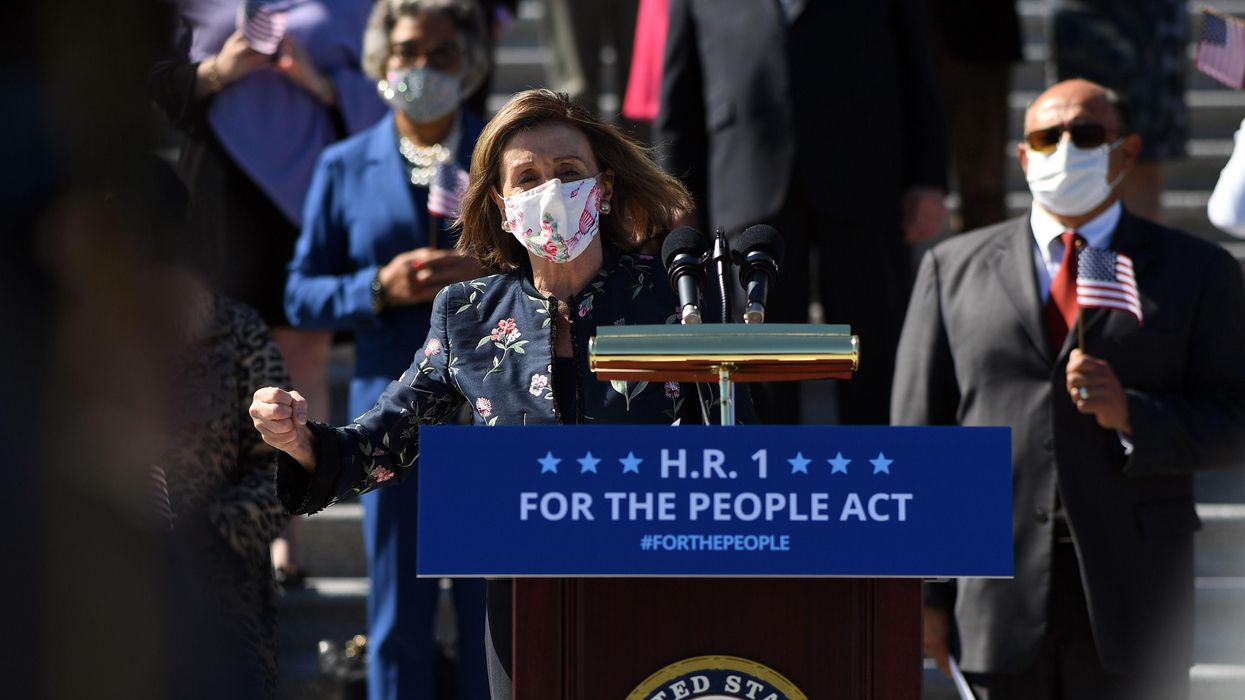Feinstein is a co-founder of the Green Party of California. He was mayor of Santa Monica from 2000 to 2002 and an unsuccessful 2018 candidate for California secretary of state.
Last week the House voted 220-210 to pass HR 1, the Democratic majority's sweeping electoral reform bill intended to strengthen voting rights, enhance campaign finance reform, and address government ethics and corruption in politics. But the legislation also contains a poison pill designed to reduce political competition and voter choice, entrenching the polarizing duopoly electoral system that made Donald Trump's presidency possible.
In practice, the single-seat, winner-take-all system that controls American elections leads to only two electorally viable parties, forcing most voters into one of two large political camps. The "us versus them" mentality that results suppresses nuance and a respect for diversity — and exacerbates divisions in our society and politics, as the violent insurrection at the Capitol on Jan. 6 laid bare.
But instead of broadening and deepening our democracy, the provision labeled Section 502(a) would make it harder for minor parties and their presidential candidates to appear on the ballot. It would do so by raising the fundraising threshold required to earn presidential federal matching funds by 500 percent, and the minimum number of contributions to reach that threshold by 625 percent. Without these funds, minor party presidential nominees would have fewer resources to promote their messages, with the public seeing a narrower range of policy approaches and perspectives.
Onerous state laws passed by Democrats and Republicans also make it difficult for minor parties to gain and maintain ballot status. Minor party presidential candidates often have to qualify themselves and their parties on an election-by-election, state-by-state basis — requiring gathering large numbers of signatures in a short time.
These expensive petition drives are often financed by presidential matching funds earned during the primary season. So, without the money, minor parties and their candidates are unlikely to appear on the general election ballot in many states. In many states, being left off the top of the ballot consigns a party to political exile, so the same exclusion may befall many third-party candidates for Congress, and state positions and in many places such local offices as city council.
Since my party began organizing across the United States, voters have elected more than 1,200 Greens to municipal office and have cast millions of votes for Green candidates at all levels. The authors of HR 1 apparently believe the voices of citizens who've voted Green (and for other minor parties) don't matter.
Democrats ignored that when their presidential nominee Al Gore lost Florida by 537 votes in 2000 — and Green Party candidate Ralph Nader gained 97,488 votes in the state — and more than 300,000 Democrats voted for Republican George W. Bush. Instead, Democrats blame the Green Party for their losses, consistently chanting "Vote Blue no matter who!"
But in 2016, with Donald Trump and Hilary Clinton the least popular major party candidates in modern U.S. polling history, "lesser-evilism" reached its nadir with the historic, "evil-of-two-lessers" presidency that has just ended. The message? Don't be surprised what voters will do when they feel deprived of meaningful and representative choice — or if they conclude the major parties offer no clear ideology or platform, but only represent a guaranteed spot on the ballot to be exploited.
Instead of trying to drive minor parties off the ballot, Democrats should put country over party, and support increased voter choice and representation, by promoting a viable multi-party democracy. They can do that by making ballot access easier, supporting ranked-choice voting for president (eliminating the vote-splitting "spoiler"' issue) and creating multimember districts with proportional representation for the House and state legislatures.
Legislation pending in the House would assign more than one member to each congressional district, and they would be chosen using ranked elections. It should be added to HR 1, which would make states create independent commissions to draw House district lines. The bill should also be altered to mandate a meaningful increase in the size of the House of Representatives, which has essentially been frozen at 435 members since 1911 — when the country's population was 94 million, compared to 330 million today.
These reforms would create a House that's truly representative of our demographic and political diversity. They would also eliminate the deeply problematic gerrymandering and lack of representation that comes from using single-member districts. By contrast, the half-measure HR 1 would still leave large numbers of losing voters in every district without representation reflecting their views — a recipe for voter alienation and blowback.
Millions are relieved our democracy appears to have survived the immediate existential threat posed by the Trump presidency. But the structural conditions that made his 2016 election possible remain in place, meaning a more competent authoritarian could end our democracy in the future.
"The biggest risk is not going too big," President Biden said when he unveiled his $1.9 trillion plan to combat the health and economic crises posed by the pandemic. "It's if we go too small."
In confronting our democracy crisis, HR 1 is going too small, by focusing on band-aids instead of wholesale transformation of our outdated electoral system, instead of transforming it. If we are going to truly meet the moment, Congress must transcend partisan self-interest and myopic, duopoly-based thinking.
To voting rights and good-government groups supporting the bill: Voting matters when your ballot can help elect someone who truly represents your view. We can't achieve that using single-member-district elections, regardless of what public matching funds are provided.
That's why HR 1 needs to be altered to promote proportional representation elections, and a viable and representative multi-party democracy overall. That would be genuinely seizing this historic moment for needed reform.



















Marco Rubio is the only adult left in the room